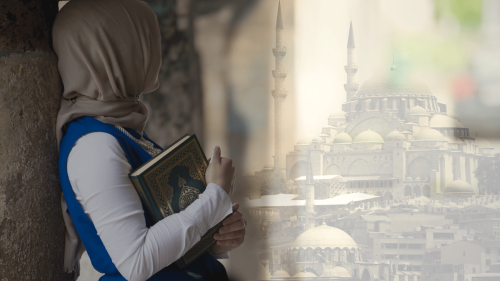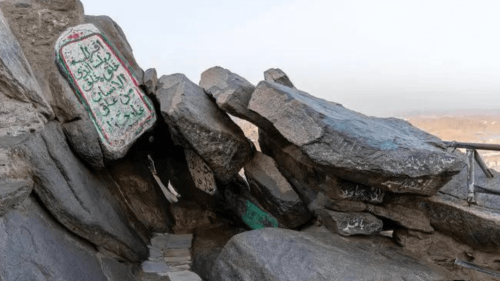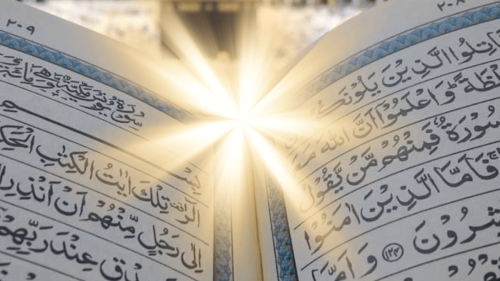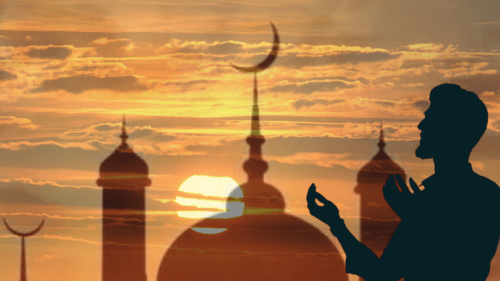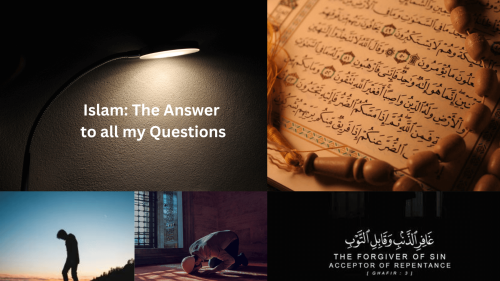Clashes of faith in Egypt
 A copy of the Bible is held high as Christians and Muslims demonstrate in front of the Egyptian Television building to protest against the torching of a church in the village of Sol in Atfeeh, south of Cairo. |
A series of Muslim-Christian violent incidents is ripping Egyptian society apart. The demolition of Atfeeh church, the killing of a woman and her family years after she converts to Islam, and the burning of Imbaba church two days ago are only the latest examples of post-revolution mayhem.
The reasons behind such violence remain the same before and after the revolution, only the tight grasp of the state absent. And a need remains to see the full picture where both Christians and Muslims may only be victims and maybe part of a plot weaved perfectly for them.
Pointing Fingers
As with other incidents, direct reference has been made to Muslim extremists for the horrendous church burning that left twelve people dead and hundreds injured. Some analysts, and many among Egyptian society, think the toppled government is involved in such events that are so unfamiliar to society here.
Regardless of the doer, the scenario is always that someone sparks fire, and the mobs follow. It is only unknown whether these mobs are people fueled with ignorance or former-government agents provided with arms and money.
In all cases, more profound factors drive the domino effect of anger that follows; which is the more dangerous part, and the part that requires more careful reading.
Islamism or Ignorance
Many sources, especially in the media, sell the argument that the cause of this increased tension is Islamism per se. It may be more accurate to say that if Islamism is one factor, it is the kind of Islamism available, and the environment it is preached in.
In an article appearing in Egyptian paper Al-Masry Alyoum, writer and satirist Belal Fadl argues that the state has eroded the role of Al-Azhar as a moderate institution and its scholars who present a holistic and knowledgeable view of Islam. The credibility of prominent Al-Azhar sheikhs, argues Belal, was undermined when they were turned into government employees, losing their independence and becoming silent culprits in forged elections and human rights violations.
Naturally, Al-Azhar scholars were replaced by more radical voices that seemed more relevant and credible to the people. These voices found a fertile soil especially in young people with much enthusiasm, much frustration and little knowledge of religion or critical thinking to guide them.
Yet it wasn't only radicalism but, as Belal Fadl restates in another article that, the making of the bomb was not gunpowder:
It was a degrading education, confused culture, deficient religiosity, defeated nationalism, and a government of misplaced priorities, and lost souls with suppressed desires, oppressed dreams, and dead imagination.
Instead of fair rulings and investigation into these - sometimes trivial - issues, the injustices, exchange of accusations and abuse goes unchecked, unquestioned and uncommented by the government, leaving all parties at a hostile stance.
A State that Lacks Justice
It's undeniable that there are forms of injustice to both the Muslim and the Christian sides worthy of consideration. The details are not the focus of this article but it may be inevitable to mention a few examples that show how, over the years, the government's lack of justice and transparency helped fuel an undercurrent of hostile feelings on both sides.
| While Christians complain about the difficulty of getting a license to build a new church, their churches are open at all times with all sorts of religious, social and sports activities possible. Muslims, on the other hand, can build mosques but their mosques were strictly open at prayer times, their doors closed even for prayer at most times of the day. An activity at a mosque was almost impossible; anything more than a memorization of the Quran is not feasible due to security concerns. |
On the Christian side, a decision by the higher institutional court to legalize second marriage for Christians, against their church laws, was rightly taken as a form of unjust interference by the state in their affairs.
For Muslims, at least three incidents where Christian women converted to Islam but were delivered to unknown fates at churches raised fury. This, and the fact that Egyptian regime casts a blind eye to proselytizing activities by the church have also contributed to the fueled environment.
More than once, Christian clerics would level abusive claims at Islam and Muslims being "guests" in Egypt and similar provocative comments that were responded to by Muslim intellects like Selim Al-Awwa.
The crucial point here is that, instead of fair rulings and investigation into these - sometimes trivial- issues, the injustices, exchange of accusations and abuse goes unchecked, unquestioned and uncommented by the government, leaving all parties at a hostile stance; what Islamic intellectual Mohamed Emara calls a "slack state".
And though it may seem that this background is irrelevant now that the former regime has been toppled, the residues of these years are still at work, and the current government-in-action still remedies matters superficially probably due to the situation in the country.
A Plan Prepared Long Ago
All the past points presented the major factors fueling sectarian tension in Egypt and it represents much of the prevailing discourse on the issue. Once a spark starts, these factors cause the situation to flare out. It remains to see the bigger context in which all these incidents fall, a context that is more related to Egypt and the region.
In this regard, Dr. Mohamed Emara's book Sectarian Strife: When, how and why? is an eye opener.
It's up to people to stop this deadly game where all players lose in the end.
Documenting sources, the book shows how minorities were seduced along history to work in favor of imperialist plans. Bonaparte promised the Jews to return to Palestine as a reward for cooperation, what came true in Belford promise. The English followed in his footsteps, lavishly supporting Christian minority as opposed to the Muslim majority, thus causing hostility.
Emara also quotes notorious Orientalist Bernard Lewis in a research calling for dividing the Middle East into mosaic societies of 32 political entities. This condition, argues Lewis, would prevent any unity and paralyze them with endless differences; all within a plan to create countries that view their differences as the source of existence and remain weaker than Israel, a condition necessary for the latter's security and survival.
The book shows how some of the mentioned Christian abusive discourse is not a coincidence but are part of an ideology that started spreading as far ago as the forties of last century among Egypt's Christians. More importantly, it provides a historical context for the violence and escalation employed to push toward a long term plan.
It would have been likely to shun such theory if one hasn't already witnessed many of the facts referred to in the book come true: if Iraq had not been occupied and shattered by sectarian killing, if Lebanon had been able to overcome its sectarian difference, and if the world hadn't found out that a fairytale agreement such as Sykes-picot existed at all.
Now What?
Now it's up to people to read history and draw their conclusions. It's up to them to stop this deadly game where all players lose in the end. It's up to them to be ignorant and act rashly, or spread knowledge and stop the bloodshed.
It's also up to the present and future governments to seek the urgently needed justice to end the hostility or follow their predecessor, let people bring justice their way, and let the country fall into an abyss of chaos.
Source: OnIslam - Yosra Mostafa
Topics: Christians, Church, Iman (Faith And Belief)
Views: 2740
Related Suggestions









